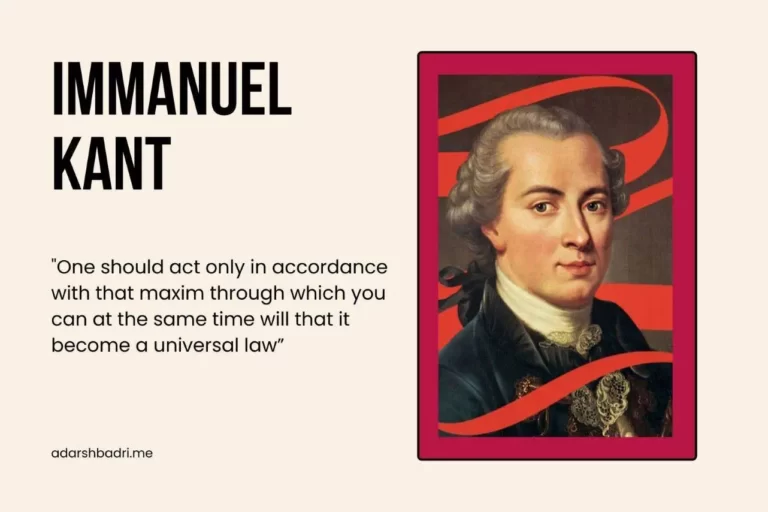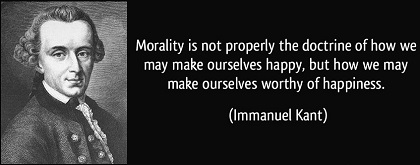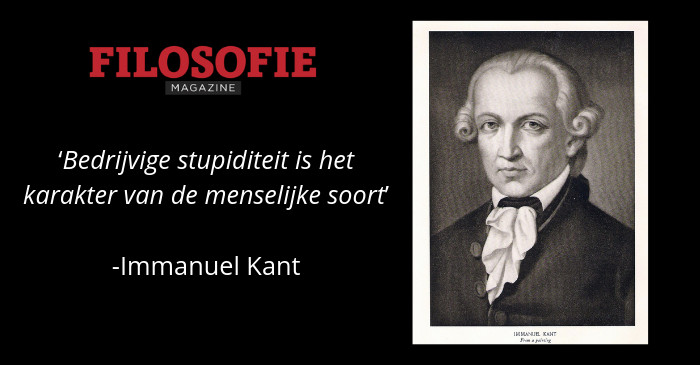
Page Description
Learn about Immanuel Kant’s philosophy, influential works, and key ideas on metaphysics, ethics, and knowledge.



Immanuel Kant: Shaping Modern Philosophy
Welcome to our exploration of Immanuel Kant, a philosopher whose groundbreaking ideas revolutionized the landscape of Western thought. Renowned for his work on metaphysics, epistemology, and ethics, Kant’s philosophy remains foundational to modern philosophy, influencing countless fields of study from politics to science.
On this page, we delve into Kant’s key theories, including his famous “Critique of Pure Reason,” and explore the lasting significance of his work. Through a series of engaging texts and videos, we’ll guide you through his complex ideas, explaining how his concepts of morality, knowledge, and reality continue to shape contemporary thought.
Join us as we uncover the profound impact of Kant’s ideas on the way we understand the world and ourselves.
Immanuel Kant: De Vormgever van de Moderne Filosofie
Welkom bij onze verkenning van Immanuel Kant, een filosoof wiens baanbrekende ideeën de Westerse denkwijze hebben getransformeerd. Bekend om zijn werk op het gebied van metafysica, epistemologie en ethiek, blijft Kants filosofie fundamenteel voor de moderne filosofie en heeft deze talloze vakgebieden beïnvloed, van politiek tot wetenschap.
Op deze pagina verdiepen we ons in Kants belangrijkste theorieën, waaronder zijn beroemde Kritiek van de Zuivere Rede, en verkennen we de blijvende betekenis van zijn werk. Aan de hand van een reeks boeiende teksten en video’s nemen we je mee door zijn complexe ideeën, waarbij we uitleggen hoe zijn concepten over moraliteit, kennis en werkelijkheid blijven bijdragen aan hedendaagse denkwijzen.
Sluit je bij ons aan terwijl we de diepe impact van Kants ideeën ontdekken op de manier waarop we de wereld en onszelf begrijpen.
Immanuel Kant was an influential German philosopher who lived from 1724 to 1804. He is widely considered to be one of the most important figures in modern philosophy, and his ideas continue to influence contemporary philosophical debates.
Here are some key points about Kant and his philosophy:
The importance of reason: Kant believed that human beings have a capacity for reason that allows us to understand the world around us and to make moral decisions.
The limits of knowledge: However, Kant also believed that our knowledge is limited by the structure of our minds and that we can never know the “thing-in-itself” or the ultimate nature of reality.
The importance of duty: Kant believed that morality is based on duty rather than consequences, and that we should act in accordance with the moral law because it is our duty to do so.
The categorical imperative: Kant’s most famous concept is the “categorical imperative,” which is a moral principle that states that we should always treat people as ends in themselves, rather than as means to an end.
The idea of autonomy: Kant believed that individuals have autonomy, or the ability to make their own choices and to be responsible for their own actions.
The idea of the “Kingdom of Ends”: Kant believed that we should strive to create a society where everyone is treated as an end in themselves, rather than as a means to an end.
The distinction between analytic and synthetic propositions: Kant believed that there are two types of propositions: analytic propositions, which are true by definition, and synthetic propositions, which can be either true or false depending on the facts of the world.
These are just a few key points about Kant and his philosophy, and there is much more to explore for those interested in delving deeper.
Immanuel Kant’s Moral Theory – a summary with examples
1 
1 jun. 2016
Immanuel Kant was a German philosopher who is considered the central figure of modern philosophy. His beliefs continue to have a major influence on contemporary philosophy, especially the fields of metaphysics, epistemology, ethics, political theory, and aesthetics. (Source: Wikipedia)
—————————————————————————
Immanuel Kant Quotes
—————————————————————————
Quote #1 – “We are not rich by what we possess but by what we can do without.”
Quote #2 – “Thoughts without content are empty, intuitions without concepts are blind.”
Quote #3 – “Experience without theory is blind, but theory without experience is mere intellectual play.”
Quote #4 – “Science is organized knowledge. Wisdom is organized life.”
Quote #5 – “All our knowledge begins with the senses, proceeds then to the understanding, and ends with reason. There is nothing higher than reason.”
Quote #6 – “Immaturity is the incapacity to use one’s intelligence without the guidance of another.”
Quote #7 – “He who is cruel to animals becomes hard also in his dealings with men. We can judge the heart of a man by his treatment of animals.”
Quote #8 – “Morality is not properly the doctrine of how we may make ourselves happy, but how we may make ourselves worthy of happiness.”
Quote #9 – “Out of timber so crooked as that from which man is made nothing entirely straight can be carved.”
Quote #10 – “Live your life as though your every act were to become a universal law.”
—————————————————————————
Music credit :
Simple Duet by Kevin MacLeod (incompetech.com)
Licensed under Creative Commons: By Attribution 3.0 License
http://creativecommons.org/licenses/b…
7 aug. 2020
Kant’s Moral Philosophy
In première gegaan op 21 nov. 2020
Kant door Henk Procee- Studium Generale
3 TOP 20 Immanuel Kant Quotes
14 dec. 2017
TOP 20 Immanuel Kant Quotes.
Wallpapers – https://quotefancy.com/immanuel-kant-…
“Do the right thing because it is right.”
— Immanuel Kant (00:00)
“Rules for Happiness: something to do, someone to love, something to hope for.”
— Immanuel Kant (00:07)
“Science is organized knowledge. Wisdom is organized life.”
— Immanuel Kant (00:14)
“If the truth shall kill them, let them die.”
— Immanuel Kant (00:21)
“Two things awe me most, the starry sky above me and the moral law within me.”
— Immanuel Kant (00:28)
“Morality is not the doctrine of how we may make ourselves happy, but how we may make ourselves worthy of happiness.”
— Immanuel Kant (00:35)
“The wise man can change his mind; the stubborn one, never.”
— Immanuel Kant (00:42)
“You only know me as you see me, not as I actually am.”
— Immanuel Kant (00:49)
“Live your life as though your every act were to become a universal law.”
— Immanuel Kant (00:56)
“We can judge the heart of a man by his treatment of animals.”
— Immanuel Kant (01:03)
“Beneficence is a duty.”
— Immanuel Kant (01:10)
“The death of dogma is the birth of morality.”
— Immanuel Kant (01:17)
“Patience is the strength of the weak, impatience is the weakness of the strong.”
— Immanuel Kant (01:24)
“Dare to think!”
— Immanuel Kant (01:31)
“There is nothing higher than reason.”
— Immanuel Kant (01:38)
“Always treat people as ends in themselves, never as means to an end.”
— Immanuel Kant (01:45)
“Experience without theory is blind, but theory without experience is mere intellectual play.”
— Immanuel Kant (01:52)
“Thoughts without content are empty, intuitions without concepts are blind.”
— Immanuel Kant (01:59)
“Nature, when left to universal laws, tends to produce regularity out of chaos.”
— Immanuel Kant (02:06)
“But a lie is a lie, and in itself intrinsically evil, whether it be told with good or bad intents.”
— Immanuel Kant (02:13)
Music credit: Easy Day – Kevin MacLeod
4 Kant’s Ethics
Immanuel Kant Quotes On Life 🔥 Top 20 Immanuel Kant Quotes
12 feb 2023 #KantianWisdom #KantianThought #ImmanuelKantQuotes
Immanuel kant quotes on life 🔥
top 20 immanuel kant quotes 🔥
Immanuel Kant was a renowned German philosopher who is well known for his contributions to the field of ethics and metaphysics. He had a unique perspective on life and his quotes continue to inspire and enlighten individuals to this day. Here, you will find a collection of the top 20 Immanuel Kant quotes on life. These wise words offer a glimpse into Kant’s philosophical views and provide insight into how he approached life. From his thoughts on morality and reason to his ideas on happiness and freedom, Immanuel Kant’s quotes are a true testament to his brilliance. So, whether you are searching for the best quotes by Immanuel Kant or just looking for a source of inspiration, this list is a must-read. Explore Immanuel Kant’s wise and thought-provoking quotes about life today!
Immanuel Kant was a highly influential philosopher who is best known for his contributions to ethics and metaphysics. His insightful aphorisms and thought-provoking quotes have left a lasting impact on the world. This collection features some of Immanuel Kant’s most inspiring quotes, including his thoughts on happiness, sex, and wisdom. Here, you will find a list of the top 8 Immanuel Kant quotes and sayings that provide a glimpse into his unique perspective on life. Whether you are searching for Immanuel Kant quotes in Hindi or looking for wise words from Immanuel Kant to help guide you on your journey to success, this collection has something for everyone. For those who are interested in learning more about Kant’s philosophical views, an Immanuel Kant audiobook is also available. So, if you’re looking to deepen your understanding of Immanuel Kant’s work, or simply seeking inspiration, be sure to check out this list of the top 20 quotes of Immanuel Kant!
In addition to his famous quotes, Immanuel Kant is also known for his “Critique of the Power of Judgment,” which is widely considered to be one of the most important works in the field of aesthetics. In this book, Kant explores the nature of beauty and the role it plays in our lives. His insights into the subject have had a profound impact on the way we understand and appreciate art.
For those looking for inspiration, Immanuel Kant’s quotes on happiness and wisdom are sure to hit the spot. His wise words offer a refreshing perspective on life and provide guidance for those seeking to live a meaningful and fulfilling existence. So, whether you are searching for quotes by Immanuel Kant on sex, or simply looking for some inspiring quotes to help you navigate life’s challenges, this collection has something for everyone.
5 Immanuel Kant’s Critique of Pure Reason
6 From Kant to Hegel
7 – 10 Life Lessons From Immanuel Kant (Kantianism)
2 dec. 2020
In this video we will be talking about 10 Life Lessons From Immanuel Kant. Immanuel Kant is considered to be one of the greatest German philosophers and one of the central Enlightenment thinkers of all time. His philosophy is called Kantianism.
So here are 10 Life Lessons From Immanuel Kant –
01. Do not treat others as merely means
02. Fight for freedom
03. Respect animals
04. Act from duty
05. Have your own moral law
06. Never lie
07. Become worthy of happiness
08. Do not base your morality on religion
09. Do not let people step on you
10. Get busy
I hope you enjoyed watching the video and hope these 10 life lessons from Immanuel Kant will add value to your life.
Immanuel Kant lived in the 18th century and is considered to be one of the greatest German philosophers and one of the central Enlightenment thinkers of all time. His philosophical revolution was to place the human at the center of the philosophical study of knowledge, morality, and beauty. He deeply believed that reason is the root of morality. His thoughts on the relationship between reason and human experience led to the notion of “procedural humanism” or “Kantian humanism”.
The work of Immanuel Kant is still relevant today as the humanistic values of Western culture are deeply influenced by the Kantian moral philosophy. His philosophy is called Kantianism
The fundamental idea of Kant’s “critical philosophy” – especially in his three Critiques: the Critique of Pure Reason (1781, 1787), the Critique of Practical Reason (1788), and the Critique of the Power of Judgment (1790) – is human autonomy. He argues that human understanding is the source of the general laws of nature that structure all our experience; and that human reason gives itself the moral law, which is our basis for belief in God, freedom, and immortality.
8 PHILOSOPHY: Immanuel Kant
13 nov. 2015
9 IMMANUEL KANT BY CHRISTOPHER INSOLE
10 mrt. 2012
The producer of these videos’ Dr Timothy Hull has also written the introductory book “ Faith & modern thought. The modern philosophers for understanding modern theology A jargon -busting , myth -busting introduction. Cascade books WIPE and STOCK Publishers https://www.youtube.com/watch?v=9i_d4…
“I wish I had had this book as a student—it is so much more helpful and interesting than anything else on the subject. Tim Hull offers an engaging, clear, and utterly unpretentious introduction to modern thought and modern philosophy for theologians, while at the same time giving a sophisticated and fresh reading of the history of thought. A great achievement.”
—Karen Kilby, Durham University
“Dr. Hull is a gifted teacher who has produced a convincing case for understanding theology within the bigger context of philosophy. He produces masterly studies of Kant, Hegel, Barth, Pannenberg, and others, each from a fresh angle. The book abounds in homely illustrative anecdotes and short readable sections. The incarnation and Trinity receive a rightful place. Reading the book to the end will be amply rewarded.”
—Anthony C. Thiselton, Universities of Nottingham and Chester
“Tim Hull’s book displays his wonderful gift for making profound and influential ideas accessible and enjoyable to think deeply about. With clarity, creativity, humor, and illuminating exposition of the metaphors at the heart of their projects, he shows persuasively that key figures in modern Western philosophy must be understood as religious thinkers, and that several major thinkers in modern Christian theology cannot be adequately understood apart from them.”
—Ben Fulford, University of Chester
“Tim Hull’s conversational style, coupled with crystal clear thinking, forms a perfect introduction to the long, intertwined history of philosophy and theology. A thoroughly enjoyable and thought-provoking read.”
—Isabelle Hamley, Chaplain to the Archbishop of Canterbury
“The dominant trends in modern theology were largely shaped by the intellectual movements of the eighteenth and nineteenth centuries. Recognizing the need for an accessible guide to the key figures and movements, Timothy Hull has produced a lively and informative introduction which should prove of much assistance to students.”
—David Fergusson, University of Edinburgh
10 Kant, Critique of Pure Reason, Robert Paul Wolff Lecture 1
31 aug. 2016
11 Kant’s Ethics 1
18 sep. 2011
12 Kant’s Ethics 2
13 Kant’s Ethics 5
18 sep. 2011
14 Ridiculous Flying Carpets Prank
6 mei 2012